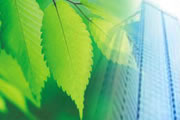
April 28, 2006
“Greening” at IDB headquarters and country offices
The IDB’s 2005 Sustainability Review discusses the Bank’s sustainable practices both in the field and at home
You can learn a lot from the back of a Starbuck’s napkin. Above the friendly recycling arrows, it relays that the product is made from 100 percent recycled fibers, at least 40 percent post-consumer material and that no bleach was used in its production, a mini advertisement for the company’s environmental savviness.
This informal way to disclose corporate sustainable practices to coffee drinkers worldwide is reflective of the trail blazed by private companies over the past decade in issuing reports on corporate social responsibility.
Commercial banks have also joined this trend, publicizing issues related to sustainability within their business practices. Reflective of the mounting interest in corporate social responsibility among private sector banks are the growing ranks of institutions that have adopted the Equator Principles, a framework to help financial institutions manage social and environmental issues in their operations. Largely stemming from the reporting initiatives of private sector banks, multilateral development institutions have begun to follow suit by compiling more comprehensive sustainability reports on their activities, building upon already existing practices of annually reporting on their environmental and social track records.
The first of its kind for the IDB, the 2005 Sustainability Review provides a panorama of the Bank’s overarching commitment to environmentally and socially sound development strategies in Latin America and the Caribbean, including initiatives to improve regional policy, regulatory and institutional frameworks for sustainable social and environmental management.
Integral to the IDB’s process of completing its first sustainability review has been deciding how to define sustainability and understanding what it means to the Bank, a task that’s more complex than it appears at first glance. In its most basic form, the review defines sustainable development as meeting the needs of the present without compromising the ability of future generations to meet their own needs, a definition which is applicable to both the IDB’s in-country and in-house operations.
An overview of in-house efforts to minimize the Bank’s corporate footprint at Bank Headquarters in Washington D.C., the 26 country offices throughout the region and the Paris and Tokyo offices, is also included in the review.
Minimizing the IDB’s corporate footprint
From cutting emissions and implementing the use of eco-friendly paint and carpet cleaner to installing water-free urinals, the Bank is making strides towards “greening” itself from within.
As part of the overarching goal to mainstream sustainability into all areas of corporate operations, the IDB began a process of self-evaluation in 2005, starting with Bank Headquarters. By closely examining the facility’s consumption patterns and major emissions, problem areas were pinpointed and plans of action developed.
One of the first issues to be tackled following this evaluation was water consumption, which fell by 9 percent from 2004 to 2005—from 21.2 to 19.2 million gallons—after water-free urinals were installed throughout the two main buildings. Following this initial improvement in water savings, the Bank expects to see more significant decreases in future years.
Overall energy consumption also decreased from 2004 to 2005, and consequently, so did emissions such as carbon dioxide and nitrogen oxides.
According to the review, the IDB recycles about 10 tons of paper, aluminum, glass and plastic each month and in 2004, begun to crush and recycle all fluorescent light bulbs, a process which reduces the amount of mercury waste that ends up landfills. Additionally, all waste paper and photocopier toners are recycled.
Greening from within
Giving older buildings a “green” facelift by replacing existing fixtures and systems with cost-effective sustainable alternatives is a gradual process.
Part of this process is rethinking the use of everyday products, from the various sprays and foams used to clean the bathrooms to toilet paper and paper towels. The Bank only uses eco-friendly cleaning products, over 40 percent of which are Green Seal approved, and over half of the paper products used have the same seal of approval. The Green Seal paint standard is also increasingly being adhered to and all paper products in bathrooms and pantries are now made from 80 percent recycled materials.
The IDB is currently working towards meeting the LEED-EB building standard, or the Leadership in Energy and Environmental Design’s Green Building Standard for Existing Buildings. This rating system of design standards provides a baseline from which to measure a building’s operational efficiency, as well as progress made towards implementing environmentally sound practices.
Additionally, in revamping its country offices, the IDB has increased the use of solar energy and is conserving energy through various insulation techniques, motion and heat sensors, low consumption lighting and water fixtures and more efficient air filters.
In concluding, the 2005 Sustainability Review provides concrete examples of the moves the IDB is making towards minimizing its environmental and social impact, while also signaling that much work remains on the path towards adopting truly sustainable practices.
Also available in: Español
© 2006 Inter-American Development Bank. All rights reserved.









